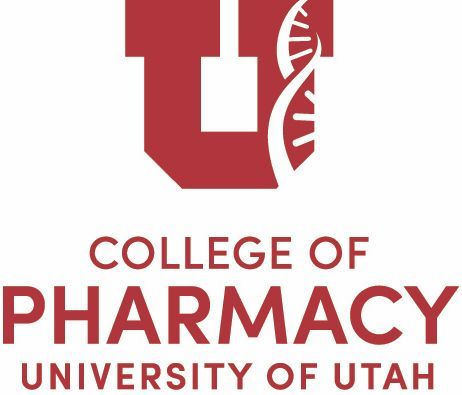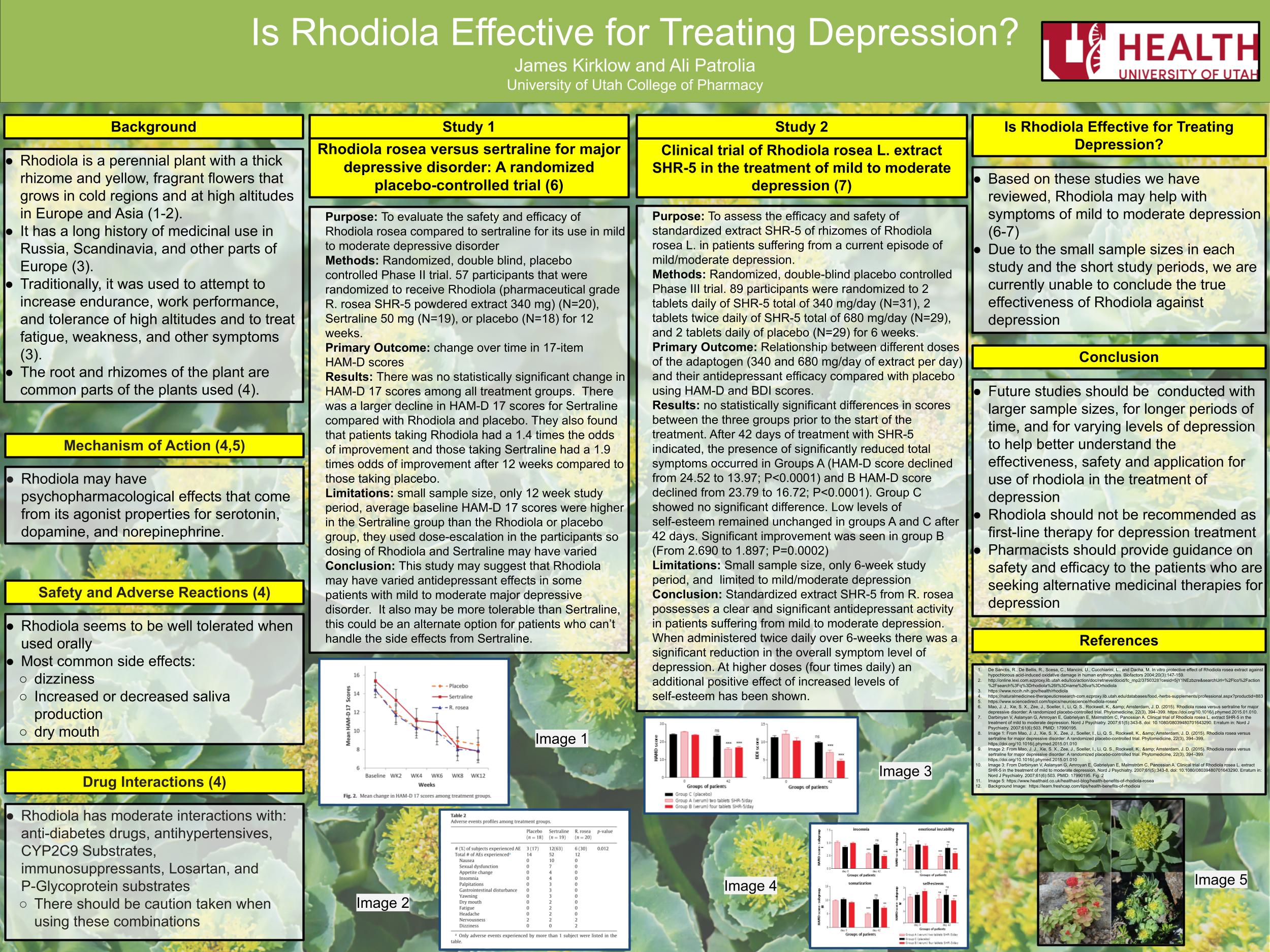Poster Presentation by: James Kirklow and Ali Patrolia
Background
Rhodiola is a perennial plant with a thick rhizome and yellow, fragrant flowers that grows in cold regions and at high altitudes in Europe and Asia.
Mechanism of Action: Rhodiola may have psychopharmacological effects that come from its agonist properties for serotonin, dopamine, and norepinephrine.
Adverse Effects: Rhodiola seems to be well tolerated when used orally. The most common side effects are dizziness, increased or decreased saliva production and dry mouth.
Drug Interactions: Rhodiola has moderate interactions with: anti-diabetes drugs, antihypertensives, CYP2C9 Substrates, immunosuppressants, Losartan, and P-Glycoprotein substrates.
The purpose of this review poster is to determine if rhodiola is effective in treating patients diagnosed with depression.
Clinical Evidence
Study 1: Rhodiola rosea versus sertraline for major depressive disorder: A randomized placebo-controlled trial. This was a randomized, double blind, placebo controlled Phase II trial that was conducted to evaluate the safety and efficacy of Rhodiola rosea compared to sertraline for its use in mild to moderate depressive disorder. It included 57 participants that were randomized to receive Rhodiola (pharmaceutical grade R. rosea SHR-5 powdered extract 340 mg) (N=20), Sertraline 50 mg (N=19), or placebo (N=18) for 12 weeks. The primary outcome was the change over time in 17-item HAM-D scores. The results showed there was no statistically significant change in HAM-D 17 scores among all treatment groups. There was a larger decline in HAM-D 17 scores for Sertraline compared with Rhodiola and placebo. The authors concluded rhodiola may have antidepressant effects in some patients with mild to moderate major depressive disorder. It also may be more tolerable than Sertraline, this could be an alternate option for patients who can’t handle the side effects from Sertraline.
Study 2: Clinical trial of Rhodiola rosea L. extract SHR-5 in the treatment of mild to moderate depression. This was a randomized, double-blind placebo controlled Phase III trial. 89 participants were randomized to receive 2 tablets daily of SHR-5 total of 340 mg/day (N=31), 2 tablets twice daily of SHR-5 total of 680 mg/day (N=29), and 2 tablets daily of placebo (N=29) for 6 weeks. The primary outcome of the study was the relationship between different doses of the adaptogen (340 and 680 mg/day of extract per day) and their antidepressant efficacy compared with placebo using HAM-D and BDI scores. The results showed no statistically significant differences in scores between the three groups prior to the start of the treatment. After 42 days of treatment with SHR-5 indicated, the presence of significantly reduced total symptoms occurred in Groups A (HAM-D score declined from 24.52 to 13.97; P<0.0001) and B HAM-D score declined from 23.79 to 16.72; P<0.0001). Group C showed no significant difference. Low levels of self-esteem remained unchanged in groups A and C after 42 days. Significant improvement was seen in group B (From 2.690 to 1.897; P=0.0002). The authors concluded that standardized extract SHR-5 from R. rosea possesses a clear and significant antidepressant activity in patients suffering from mild to moderate depression.
Conclusion
These reviewed Phase II and Phase III trials indicate that rhodiola may help reduce symptoms of depression in patients diagnosed with mild to moderate depression. However due to the small sample sizes in each study and the short study periods, we are currently unable to conclude the true effectiveness of Rhodiola against depression.
References
- De Sanctis, R., De Bellis, R., Scesa, C., Mancini, U., Cucchiarini, L., and Dacha, M. In vitro protective effect of Rhodiola rosea extract against hypochlorous acid-induced oxidative damage in human erythrocytes. Biofactors 2004;20(3):147-159.
- Lexicomp Database: http://online.lexi.com.ezproxy.lib.utah.edu/lco/action/doc/retrieve/docid/fc_rnp2/3750328?cesid=5jY1NEzbzre&searchUrl=%2Flco%2Faction%2Fsearch%3Fq%3Drhodiola%26t%3Dname%26va%3Drhodiola
- https://www.nccih.nih.gov/health/rhodiola
- Natural Medicines Database: https://naturalmedicines-therapeuticresearch-com.ezproxy.lib.utah.edu/databases/food,-herbs-supplements/professional.aspx?productid=883
- https://www.sciencedirect.com/topics/neuroscience/rhodiola-rosea”
- Mao, J. J., Xie, S. X., Zee, J., Soeller, I., Li, Q. S., Rockwell, K., & Amsterdam, J. D. (2015). Rhodiola rosea versus sertraline for major depressive disorder: A randomized placebo-controlled trial. Phytomedicine, 22(3), 394–399. https://doi.org/10.1016/j.phymed.2015.01.010.
- Darbinyan V, Aslanyan G, Amroyan E, Gabrielyan E, Malmström C, Panossian A. Clinical trial of Rhodiola rosea L. extract SHR-5 in the treatment of mild to moderate depression. Nord J Psychiatry. 2007;61(5):343-8. doi: 10.1080/08039480701643290. Erratum in: Nord J Psychiatry. 2007;61(6):503. PMID: 17990195.



Responses
Hello James and Ali – what are the two main things you learned from preparing and developing this topic?
Hi Dr. Shane-McWhorter, thank you for your questions. The first thing I learned from preparing and developing this topic was that it can be very difficult to find large studies on herbal supplements. The second thing I learned was that it is hard to get a definite answer to a question from studies like this, there is definitely a need for further studies in this area.
Hello Dr. Shane-McWhorter. I learned how to better collaborate with another person on research, review, developing, formatting, and executing a poster project. We do not get to work on many posters during our college careers in my experience, so it is a great experience to learn from when we get the opportunity! I also learned how better extract important data in a concise manner to present from studies about our herbal supplement. Another important skill that we cannot get enough experience and practice doing.
Nice poster. What specific effects occur with drug interactions that you mentioned? In the first study what were the baseline and post-treatment HAM-D scores? In the second study, how did the authors define mild or moderate depression? Any idea of NNT in each study?
For the second study individuals were required to have clinically significant depression. So only patients with initial scores of greater than or equal to 13 on the Beck Depression Inventory (BDI: 13 item short form version; score ranges of 5–7 for mild depression, 8–15 for moderate depression) and greater than or equal to 21 on the Hamilton Rating Scale for Depression (HAMD: 21-item version; mild to moderate depression 14 to 17). An NNT was not provide, looked at, or calculated within this study.
Taking Rhodiola with anti-diabetic drugs might increase the risk of hypoglycemia. Taking Rhodiola with anti-hypertensive drugs might increase the risk of hypotension. Taking Rhodiola with CYP2C9 substrates might increase levels of drugs metabolized by CYP2C9. Rhodiola might interfere with immunosuppressive therapy if taken together. Rhodiola might increase levels of P-glycoprotein substrates if taken in combination.
In the first study the average baseline HAM-D scores for the Rhodiola group was 14.4 +/- 3.7, Sertraline group was 15.4 +/- 3.9, and placebo group was 14.4 +/- 2.1. By week 12 the change in HAM-D scores for Rhodiola was -5.1, 95% CI: -8.8 to -1.3, for Sertraline was -8.2, 95% CI: -12.7 to -3.6, and placebo was -4.6, 95% CI: -8.6 to -0.6. This study also did not report a NNT.
Does Rhodiola have any interactions with SSRIs like how St. John’s Wort does?
Hello Emi, Natural Medicines did not denote any interactions with SSRIs or specifically St. John’s Wort. Lexicomp also was unable to denote any interactions either. However, due to Rhodiola being CYP2D9 inhibitor it is expected to interact with antidepressants. This interaction is associated with a significant risk of pharmacokinetic and pharmacodynamic interactions, as concluded in the research conduced by Jaroslaw Woron, et al in “Unwanted effects of psychotropic drug interactions with medicinal products and diet supplements containing plant extracts”
Does rhodiola take weeks to have effect like the Rx antidepressants?
Thanks for your question James. Early research shows that taking rhodiola might improve symptoms of depression after 6-12 weeks of treatment in people with mild-to-moderate depression, so unfortunately with the data we have so far it seems that it takes similar amounts of time for it to have anti-depressant effects as it does with prescription antidepressants.
Awesome job on the poster and the summary of studies! Has there been any comparisons of rhodiola with other antidepressant classes such as SNRIs and TCAs?
Thanks for your question Gisoo! When we did a literature search for this project we didn’t find any other studies comparing rhodiola to other antidepressant classes. That would definitely be interesting to look further into though.
Interesting poster!! I have seen this in some supplements but never thought it has antidepressant properties. I was curious after studying this and looking up studies would you consider trying it? I was just curious about your personal opinion:)
Hi Jake! Before working on this poster, I actually never heard of this supplement. With any medication or supplement I am usually hesitant on trying products without a decent number of high quality studies to back their use case. I would personal stick with first-line/standard/doctor recommended treatments before looking into alternative with less scientific backing. Thanks for the question!
Hello James and Ali!
Were there any recommendations for what dose of Rhodiola a patient should start to treat mild or moderate depression?
Hello Ryley, great question! Because this supplement isn’t as well studied as some other popular supplements are, doses vary from 100 – 600 mg. Natural Medicine and other studies, like the ones above, reports that taking a specific Robiola 340 mg once daily may reduces symptoms of mild to moderate symptoms of depression after 6 weeks of treatment compared to placebo. Increasing the dose to 600+ mg daily may also increase self-esteem as seen in study 2!
Hi Ali and James
NIce work on this poster! I learned a lot about new plant properties. I like the color format of the poster which coincides with the plant! Creative! I agree that it looks like more study participants are needed to truly see if there is an impact on depression therapy!! Thank you for sharing your expertise!!
Thank you so much Dr. Orlando! 🙂
Comments are closed.